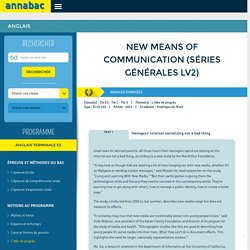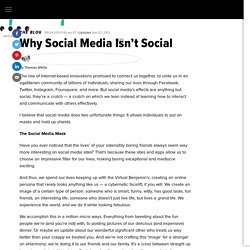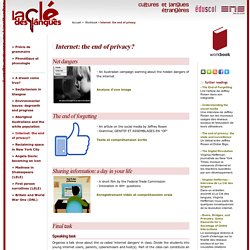

Black Mirror - The future of social media. Rating everyone in your daily interactions. I forgot my phone. This EFL lesson is designed around a beautiful short film by Miles Crawford titled I lost my phone and the theme of mobile phones.

Students listen to a film and speculate about what is happening, watch the film to check their answers and talk about mobile phone use. Language level: Intermediate (B1) – Upper Intermediate (B2) Learner type:Teens and adults Time: 90 minutes Activity: Watching a short film, speculating and speaking Topic: Mobile phones Language: Present continuous tense; modal verbs of speculation and vocabulary related to mobile phones. Materials: Short film Downloadable materials: I forgot my phone lesson instructions The School for Training is a small specialist teacher training institute in Barcelona, providing innovative courses of the highest quality for teachers from around the world. Find out more about the courses and how to enrol here. Look Up – Lève les Yeux par Gary Turk.
Une jolie vidéo et un poème inspiré pour inciter à la déconnexion digitale et se reconnecter avec le monde qui nous entoure.

Je ne vais pas mentir je me reconnais dans certains passages mais ne dit-on pas qu’il faut d’abord prendre conscience du problème pour le résoudre ? Je vous laisse appréciée l’exercice poétique de Gary Turk que j’ai essayé de traduire en conservant l’esprit et les rimes. Look up – Gary Turk I have 422 friends, yet I am lonely. I speak to all of them everyday, yet none of them really know me. The problem I have, sits in the spaces between, looking into their eyes, or at a name on a screen.
I took a step back, and opened my eyes, I looked around, and then realised that this media we call social, is anything but when we open our computers, and it’s our doors we shut. Wonderful Internet (écrit séries générales LV1) CO bac anglais: how technology saved your life. CO bac anglais: selfies, identity theft (with script) The End of Forgetting — Anglais. Four years ago, Stacy Snyder, then a 25-year-old teacher in training at Conestoga Valley High School in Lancaster, Pa., posted a photo on her MySpace page that showed her at a party wearing a pirate hat and drinking from a plastic cup, with the caption "Drunken Pirate.

" After discovering the page, her supervisor at the high school told her the photo was "unprofessional," and the dean of Millersville University School of Education, where Snyder was enrolled, said she was promoting drinking in virtual view of her under-age students. As a result, days before Snyder's scheduled graduation, the university denied her a teaching degree. Snyder sued, arguing that the university had violated her First Amendment rights by penalizing her for her (perfectly legal) after-hours behavior. But in 2008, a federal district judge rejected the claim, saying that because Snyder was a public employee whose photo didn't relate to matters of public concern, her "Drunken Pirate" post was not protected speech. Sharing Information: A Day in Your Life. New means of communication (séries générales LV2) Good news for worried parents: all those hours their teenagers spend socializing on the Internet are not a bad thing, according to a new study by the MacArthur Foundation.

“It may look as though kids are wasting a lot of time hanging out with new media, whether it’s on MySpace or sending instant messages,” said Mizuko Ito, lead researcher on the study, “Living and Learning With New Media.” “But their participation is giving them the technological skills and literacy they need to succeed in the contemporary world. They’re learning how to get along with others, how to manage a public identity, how to create a home page.” The study, conducted from 2005 to last summer, describes new-media usage but does not measure its effects. “It certainly rings true that new media are inextricably woven into young people’s lives,” said Vicki Rideout, vice president of the Kaiser Family Foundation and director of its program for the study of media and health.
Ms. Les réseaux sociaux (compréhension de l'écrit) Compréhension de l’écrit 10 pts Doc. 1Teenagers, Internet socializing not a bad thing Doc. 2Generation gap 1 Doc. 1. line 1: “Good news for worried parents”.

What is the good news about? 2 Doc. 1. Why Social Media Isn't Social The rise of Internet-based innovations promised to connect us together, to unite us in an egalitarian community of billions of individuals, sharing our lives through Facebook, Twitter, Instagram, Foursquare, and more.

But social media’s effects are anything but social, they’re a crutch — a crutch on which we lean instead of learning how to interact and communicate with others effectively. I believe that social media does two unfortunate things: It allows individuals to put on masks and hold up shields. The Social Media Mask Have you ever noticed that the lives’ of your ostensibly boring friends always seem way more interesting on social media sites? That’s because these sites and apps allow us to choose an impressive filter for our lives, making boring exceptional and mediocre exciting. And thus, we spend our lives keeping up with the Virtual Benjamin’s; creating an online persona that rarely looks anything like us — a cybernetic facelift, if you will.
HOW SOCIAL MEDIA AFFECTS TEENS - Documentary. 5 Crazy Ways Social Media Is Changing Your Brain Right Now. Award Winning Short Film. Are You Living an Insta Lie? Social Media Vs. Reality. Is Social Media Good for You?
Aol ¨the internet is a good thing´´ ad. Internet: the end of privacy? - The End of ForgettingLire l'article de Jeffrey Rosen dans son intégralité. - Understanding the social mediaUne interview de Jeffrey Rosen sur les nouveaux usages des réseaux sociaux et l'éducation de leurs utilisateurs. - The end of privacy: the state and surveillanceUn débat entre Jeffrey Rosen et Didier Bigo. - The Digital RevolutionVirginia Heffernan, journaliste au New York Times, évoque la naissance d'internet et les réactions suscitées par son développement.
